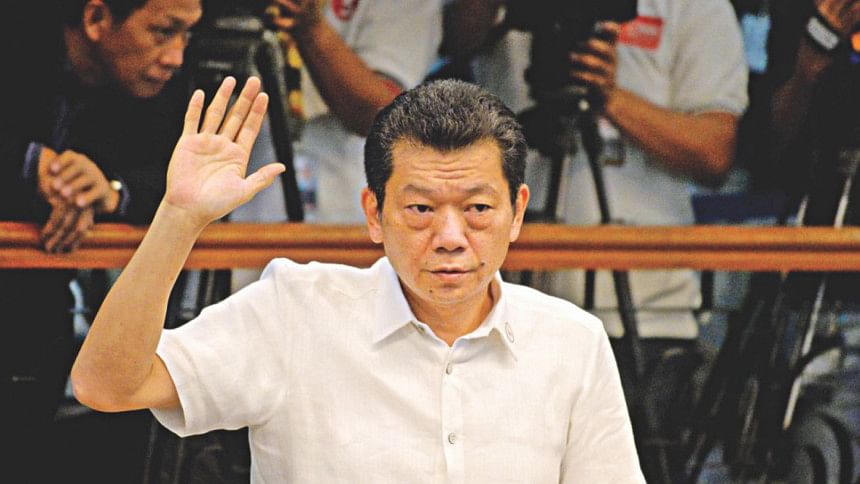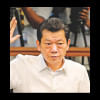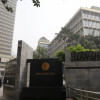Filipino willing to return $14.3m

Kim Wong, the Filipino casino operator dubbed the “missing link” in the cyber heist of $81 million in Bangladesh Bank reserves, said he is willing to return up to $14.3 million he received from two Chinese nationals linked to the stolen funds.
Wong told a Philippine Senate hearing yesterday that he was merely an interpreter when one of the two men asked the manager of a Rizal Commercial Banking Corp (RCBC) branch to open the accounts where the money eventually ended up.
He received $4.6 million as gambling funds lodged in his company, and another 450 million pesos ($9.7 million) as debt payment from one of the men he identified as a business associate, Bloomberg reports quoting Wong.
“I had nothing to do with the actual opening of accounts,” Wong said at the hearing before the Senate Blue Ribbon Committee. "I had nothing to do with the falsification of bank documents so the money could get in, and I don't know where the $81 million came from."
Following the heist, the millions stolen from the Bangladesh central bank's American accounts on February 5 were immediately sent via electronic transfer to the Philippine bank.
The dollar accounts where the stolen funds landed were reportedly opened by two men, Sua Hua Gao from Beijing and a Macau associate identified as Ding Zhize, in Manila's RCBC nine months before the theft.
"The two foreigners were responsible for bringing in the $81 million," Wong said at the Senate hearing, according to an AFP report.
A portion of the money was later converted into Philippine pesos and deposited into Wong's account at a Manila mega-casino where the junket operator is based, Filipino investigators have alleged.
Wong and another Chinese casino junket operator, Weikang Xu, are under criminal investigation by Filipino prosecutors for their alleged role in laundering the proceeds of the heist.
Wong said he was told last month by the duo that "money was coming" to the five RCBC accounts.
The authorities said the cyber heist occurred a day later.
RCBC has admitted the accounts through which the allegedly stolen money was deposited had been opened under fictitious names.
Wong's testimony appears to shed some light on the brazen caper that has forced Bangladesh Bank governor Atiur Rahman to resign and highlighted how the Philippines has become a money-laundering destination due to loose regulation of its casinos.
Philippine law exempts casino transactions from scrutiny by the country's anti-money laundering council without a case filed in court.
Wong described Sua as a "big junket operator" who was 450 million pesos ($9.7 million) in debt at Manila's Solaire, one of the Philippines' biggest casinos.
Wong said the high roller told him he would use the RCBC dollar accounts to transfer money to pay off his debt.
"He said he was selling property in China," Wong told the hearing.
However, Ding said he was planning to invest in the Philippines because "casinos in Macau are struggling", according to Wong.
The current whereabouts of the two Chinese nationals is unknown.
The Senate investigation had earlier established that $29 million of the stolen Bangladesh Bank money was shifted to Solaire.
Wong said his friend and RCBC branch manager Maia Deguito, who authorities say is a suspect in the Philippine investigation, helped open the dollar accounts, reportedly telling Sua at one point: "Leave it to me."
Wong said Gao has been a junket agent for almost eight years now, while Ding, a businessman from Macau, was introduced to him by Gao.
Wong said Gao borrowed 450 million pesos from him after incurring big losses at a casino in Solaire, according to the Inquirer.
At that time, he said, the former branch manager of RCBC-Jupiter in Makati City, Maia Santos-Deguito, had been asking him to open an account in her branch. He then referred Gao to Deguito.
Wong said he and Gao met Deguito in his office at the Midas Hotel sometime in May 2015.
Wong said Gao wanted to open a dollar account but the branch manager said they needed five persons to open an account for a company.
“Gao said that we would probably find it difficult to open an account. Maia told us that she would take care of it. I was in a hurry, and she offered to assist us,” Wong said.
After two or three days, Wong said Deguito called asking for $2,500 to open the five dollar accounts.
On February 4 this year, Wong said Gao told him that he and Ding would close their casino in Macau and would just invest in Manila.
On February 5, Wong said he met both Gao and Ding at the Solaire hotel and the two had told him to call Deguito to check on the five bank accounts.
After repeated calls, Wong said Deguito called again at around 1pm and informed them about the tranches of funds that started to come into the accounts totalling $81 million, the Inquirer reported.
Wong said he then asked Deguito if she could bring the money to the hotel.
At around 7:00pm the same day, Wong said Michael Bautista of Philrem Service Corporation arrived with 80 million pesos supposedly upon Deguito's request.
“Maia was supposed to bring the remaining 20 million pesos. She then arrived,” he said.
Aside from the 100 million pesos in cash that was delivered to the hotel, Wong said he also collected a total of 300 million pesos and $5 million cash from Bautista's house.
He said he picked up the first 100 million pesos and $3 million cash from Bautista's house on February 9, another 100 million pesos and $2 million cash on February 10, and another 100 million pesos on February 14.
In his opening statement, Wong accused Deguito of forging the documents of the bank five account holders used to receive and withdraw the stolen funds.
“It was also Maia who pursued all means to release the money from the bank,” Wong said.
Of the total $81 million stolen funds that were deposited and withdrawn from the RCBC branch of Deguito, Wong said about $63 million went to Midas and Solaire casinos.
“The balance of more or less $17 million, as far as I know, is with Philrem,” he said.
Deguito, who has denied involvement in money laundering, was suffering from fatigue and was absent from Tuesday's hearing, her lawyer said.
None of the money has been recovered yet.
FED SHOULD RETURN MONEY: AJMALUL
Bangladesh may not have to sue the New York Fed if the bank returns the $81 million stolen from the Bangladesh Bank account with it to protect its reputation, lawyer Ajmalul Hossain QC said yesterday.
The BB, which plans to sue the Fed and three other banks for negligence, appointed the senior Supreme Court lawyer last week to help it get back the stolen money.
The NY Fed should return the money out of embarrassment, he told reporters in the capital.
“Then there will be no need to file the lawsuit. There is a strong reputational risk for the New York Fed, as many central banks may deem it insecure and take back their money.”
The Fed provides banking services to approximately 250 foreign central banks and other official institutions.
Foreign central banks open accounts with the Fed to accommodate international monetary transactions, settle their US dollar obligations, and hold their foreign reserves.
Ajmalul said it was very important to find out whether the Fed breached the contract by allowing hackers to transfer the $81 million to bank accounts in the Philippines.
The lawyer also said it appears that there are some shortcomings in the Fed's system.
The Fed thought that some of the instructions sent to it were not genuine. “They had sought confirmation from the BB. But the Fed made the payments before getting confirmation,” Ajmalul said.
If funds were transferred from someone's account to another account through illegal means, then there is a system to recall the money, said the lawyer.
The payment instructions were sent from the BB on February 4, but the payment was made on February 9, because of the holidays in Bangladesh, the US and the Philippines.
“Though BB's system was not working on those five days, BB had sent complaints through letters, emails and SWIFT messages, saying it had not made the payment instructions. But responses of those correspondences did not arrive,” he said.
The BB even wrote a letter to the Fed based on detailed information on February 24, but it is yet to get any response.
Asked whether there are enough grounds for the BB to file a lawsuit, he said, “Of course cases can be filed because we are the victim of the theft. The money has to be paid as per our instructions, but we did not give the instructions.
“It is clear that the thieves gave the instructions. If you act on the instructions given by thieves, then definitely we can ask for return of the money,” he added.

 For all latest news, follow The Daily Star's Google News channel.
For all latest news, follow The Daily Star's Google News channel. 







Comments